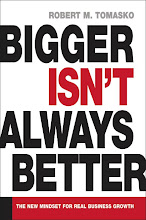October 11, 2008
When in a deep hole …
… the best thing to do is to stop digging. That’s Washington Post Pulitzer Prize winner Steve Pearlstein’s advice about what to do next.
He also reminds us:
Steve is a realist, not an ideologue:
Link
He also reminds us:
“As we should have learned long ago, markets are not self-correcting. They require collective action to put them back into working order.”
Steve is a realist, not an ideologue:
“… at this moment what's most needed is to direct the capital toward the biggest institutions that present the biggest risk to the stability of the rest of the financial system, whether they are banks, investment houses, insurance companies or non-bank lenders like General Electric.”
“Wouldn't that be picking winners and losers? In a way, yes. But remember that the reason we are in this fix is because markets, at least for the moment, are broken and can't be relied on to allocate capital more wisely than Hank Paulson. A little bit of well-timed, well-crafted socialism is just the thing to save capitalism from itself.”
Link
October 09, 2008
Greenspan vs. Buffett
Was the US economy led down the wrong path by Alan Greenspan? Today’s New York Times weighs in:
Read the full article for a good review of the dangers of faith-based economics – and the risks created when economists are treated as celebrities.
Link
"If Mr. Greenspan had acted differently during his tenure as Federal Reserve chairman from 1987 to 2006, many economists say, the current crisis might have been averted or muted."
“ 'He had a way of speaking that made you think he knew exactly what he was talking about at all times,' said Senator Tom Harkin, a Democrat from Iowa. 'He was able to say things in a way that made people not want to question him on anything, like he knew it all. He was the Oracle, and who were you to question him?' ”
Read the full article for a good review of the dangers of faith-based economics – and the risks created when economists are treated as celebrities.
Link
October 07, 2008
Fear and Fannie
Bigger Isn’t Always Better argues that the emotion of fear often drives the quest for bigness. Fear is the biggest begetter of unwise mergers, flawed risk taking, and failed mergers.
Click the link to read how this emotion drove the actions that drove Fannie Mae over the brink.
Link
Click the link to read how this emotion drove the actions that drove Fannie Mae over the brink.
Link
Making credit safer
If you enjoyed Elizabeth Warren’s spirited description of the current financial crisis (see Sept 28 post), you’ll want to read her case for smart credit regulation. Click the link below.
Putting ideas like hers in place are what will bring the credit markets back to sustainable growth.
Link
Putting ideas like hers in place are what will bring the credit markets back to sustainable growth.
Link
